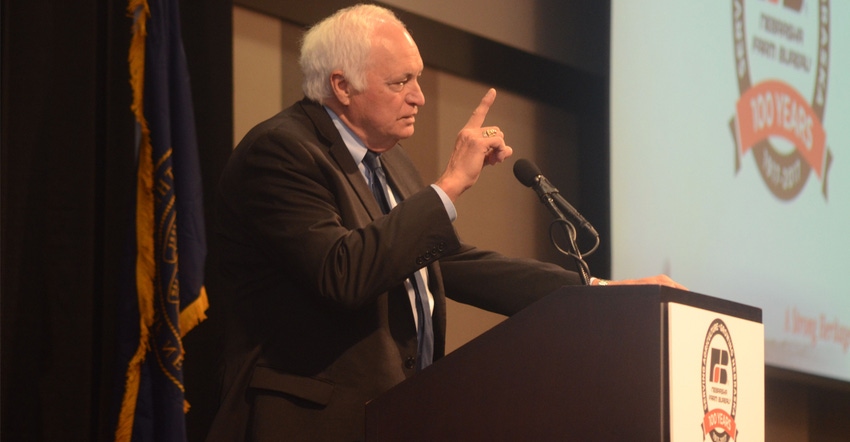
No one can predict the future. It's hard to know what tomorrow holds, let alone the next 100 years.
At Nebraska Farm Bureau's annual convention in December celebrating the organization's 100th anniversary, Lowell Catlett, noted that it may be impossible to know what the future may hold, but it will likely bring some major changes — and opportunities — to agriculture.
In his presentation, "Farmers Rule the World," Catlett, futurist and retired Regents Professor in Agricultural Economics and Agricultural Business and Extension Economics at New Mexico State University, noted that over 40 years ago in 1970, there were 3.6 billion people in the world. The U.S. became the world's first $1 trillion economy. But at the time, agriculture could not produce enough calories to meet the average human's daily needs — about 2,450 calories, Catlett said. In 2016, with 7.4 billion people in the world, agriculture produced enough to meet those daily needs and more — about 3,200 calories per person.
That's one reason Catlett said farmers already rule the world — and producers have achieved this on fewer acres.
"If you stop agriculture technology at 1970 and you want to feed those 7.4 billion people today, the 3,200 calories we produce, with the technology of 1970, you would need not fewer acres, but 7.5 billion more acres," Catlett said. That's the entire land mass of Canada, the U.S. and China combined.
"You rule the world of food and you rule the world in acres that don't have to be in agriculture," he said. "We have more wetlands, more open pasture systems, all because you were so efficient at producing food that we got to keep those 7.5 billion acres in land other than cultivation."
Ag rules renewables
But agriculture doesn't just rule the food world. Throughout his presentation, Catlett highlighted several opportunities for agriculture and rural America, including renewable energy and renewable fuels.
"For the last two years in a row, [for] the installed capacity of electrical generation in the world, 60% has been in renewables — in wind, solar, biofuels and in some cases hydroelectric," he said. "As we move to renewable energy sources, you not only own food, you not only own the priceless ecological systems around us that aren't in agriculture, you own energy as well."
In addition to corn- and soy-based biofuels, with the growth of renewable energy sources like solar and wind energy distributed throughout farm country, Catlett said the power supply isn't reliant on a single power plant, but a network of different sources that users can plug into for electricity.
"It becomes the highway of the world and changes forever the way we distribute electricity," Catlett said. "And guess where most of it's going to be generated? In rural America. You own the new energy world."
This "smart grid," however, also depends on the expansion of broadband into rural areas.
The internet of things, or the connectivity of different technologies with one another, is another growing area for agriculture. And every day, Catlett said, the world produces 2.5 quintillion bytes of information. For reference, 1 quintillion is a 1 followed by 18 zeros.
The power of computing is constantly growing, Catlett said. "For all intents and purposes, computer capacity and speed is infinite," he said. "When you've got an infinite computer world, you better get ready for a revolution in robotics that's going to blow your doors off."
Robots are coming
"We added 250,000 commercial robots last year, and we added to the tune of 250,000 for the last four years," Catlett said. "In the last five years, we added more commercial robots than previously existed in the world because computer capacity and speed had gotten so good we could have commercial robots."
In agriculture, it's no secret that robotic milking is seeing the fastest growth in robotics. And Catlett notes with robotics, the production potential for dairy cows increases.
Of course, it isn't just agriculture that benefits from robotics.
Both Ford and General Motors have a goal of selling commercially available autonomous cars by 2020, and Catlett notes that with driverless cars, transportation will likely become a service that passengers can buy or subscribe to. This not only eliminates the need for parking garages, but also minimizes traffic on major thoroughfares — space that can be converted back to parks.
In Japan, a robot called Pepper, developed by Aldebaran Robotics, owned by SoftBank, is able to read human emotions. Catlett noted there are thousands of Peppers working in Japan alone — mostly in health care.
The powerful thing about Pepper is it is not just helping men and women out of the bathroom, Catlett said. “They're using Pepper because it understands many human emotions. It talks to people that have dementia and early Alzheimer's and it's a form of communication that they don't have with people," he said. "In that world, is it any wonder that a cow is more productive if she's got a robot? It will blow the doors off of agriculture in a positive way, because this whole animal welfare thing is not going to go away."
And the potential of the internet of things isn't even close to being realized. Catlett said roughly 99.8% of all things that could communicate with one another, don't communicate with one another.
"Get ready for the data explosion because it's going to come," Catlett said. "If you thought the chemical revolution was big, if you think the mechanical revolution was big, if you think molecular and genetics revolution was big, get ready for the information revolution, because the value of how you produce a product will be worth more than the value of the product itself."
About the Author(s)
You May Also Like






